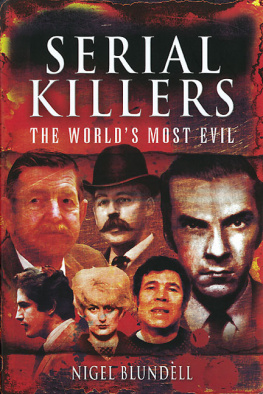
Dan Gretton
I YOU WE THEM
Journeys Beyond Evil: The Desk Killers in History and Today
VOLUME 1

Contents
About the Author
Dan Gretton is a writer, activist and teacher. In 1983 he co-founded the pioneering political arts organisation Platform, in Cambridge, where he studied English literature. As well as working with Platform over many years on the human rights and environmental impacts of corporations, he has also developed radical initiatives in adult education and has lectured internationally on the subject of the desk killer. After more than a decade of research, aided by a major award from the Lannan Foundation, he embarked on the writing of I You We Them. He currently divides his time between north-west Wales and east London, where he shares his garden with a family of foxes.
Once we accept, for a single hour or in a single exceptional case, that there can be something more important than sympathy for others, there is no crime against humanity that we cannot commit with a clear conscience I was thinking about all those men the superintendent, the convoy soldiers and all the others most of them nice, kind individuals, who have turned into bad people only because of their official positions These people terrify me. And indeed they are terrifying people more terrifying than any marauding gangster. He might feel some pity, but not these men: theyve taken out insurance against pity
Imagine a problem in psychology: to find a way of getting people in our day and age Christians, humanitarians, nice, kind people to commit the most heinous crimes without any feeling of guilt. There is only one solution doing just what we do now: you make them governors, superintendents, officers or policemen, a process which, first of all allows people to be treated like inanimate objects, precluding any humane or brotherly relationships, and, secondly, ensures that people working must be so interdependent that responsibility for the way they treat people never devolves on any one of them individually. Without these preconditions it would be impossible in our day and age to carry out atrocities like the things I have witnessed today.
Nekhlyudovs reflections, in Resurrection by Leo Tolstoy
In a dark time, the eye begins to see
Theodore Roethke
For Corinne and Mark,
who gave us the most vivid maps,
and opened up limitless worlds of imagination.
For J. who has walked this landscape with me.
Authors Note
I You We Them: Journeys Beyond Evil is the first part of an ongoing exploration investigating the phenomenon of the desk killer both in history and our world today the people who kill without ever leaving their offices, who rarely see the faces of their victims. This work is structured in two volumes: volume one, which you are holding in your hand, and volume two, which will be published in the near future. Each volume contains two books.
The four books were written and revised in four locations, beginning in 2006. Each place, by the sea, exerted its own influence on the writing, and, by chance not design, the beginning of each new writing phase, and each part, took place not only in a different location, but in a different season:
Volume One
Book One (Winter): East (Suffolk coast)
Book Two (Spring): West-south-west (Pembrokeshire)
Volume Two
Book Three (Summer): West-north-west (Traeth Bach)
Book Four (Autumn): West, west-north-west (Pen Lln)
For ethical, and sometimes more personal reasons, some names and identifying features have been changed.
BOOK ONE
JOURNEYS INTO THE WORLD OF THE DESK KILLERS
Preface
First Day, White Page
January 2006, Suffolk
Why are we drawn back to particular places?
Since I was a boy I have been returning here. To this unremarkable stretch of shingle on the Suffolk coast vast grey skies, the sea, usually a darker shade of grey. And undulating waves of pebbles, interrupted only by tussocks of coarse grass, somehow holding on against the bullying winds. We came here to fly kites once, but the wind defeated us, twisting the string into a dozen knots. Ive brought many friends to this place over the years, trying not to build up expectations, wanting the peculiar force of the landscape to work on them wordlessly.
The twisting road that leads here is part of it. Arriving at night, as I did yesterday, it is like sinking into the beginning of a story, the story that captivated you as a child, that you would read again and again, because the absorption into that world was so entire that, momentarily, all else would fall away. Off the motorway. Over the estuary. Round the town that wants to be a city, with its scatterings of drive-through burger bars and superstores off the ring road. Onto a main road. The white lines finally fade. A long, straight stretch through woods of pine and silver birch. Through a last village. And then the little road, barely signed at all. The road where you never meet another vehicle. Driving in a trance now, slowing to twenty, fifteen miles per hour. A tunnel of trees. The right-angle bend sweeps round. The telegraph pole where the barn owl was. To the left, a final sway the other way, out into the open again, over a small, white bridge. Tall reeds now on both sides. And finally the road becomes a track, and the track ends at the blackness of the sea. As the engine fades the certainty of that soft roar of sea and wind. And a flickering understanding that the end and the beginning are the same.
*
I am sitting in the window of a small cottage that feels more like the cabin of a boat. In front of me a January sea, two upturned dinghies, a flock of birds I cannot identify flitting in crazed gusts, a red and white plastic bag cartwheeling just too fast for me to read the writing on it. Only two figures seen all day a bearded man walking his dog, and now a distant figure, or rather a head and shoulders above the line of shingle, flying a huge, modern kite, purple and blue, that resembles a parachute. Having more success than we ever did.
And the paradox that despite the buffeting of the winds on all sides, I feel a sense of stillness for the first time in months. I always knew that the writing could only start here, and probably only at this time of year the emptiness of January. Looking to the east, beyond the grey strip of the North Sea, which used to be known as the German Ocean. And, in that sea, there still exist, in minuscule particles, the pulverised stones of Spandau prison dumped into these waters after its last prisoner died. All this time trying to understand violence, and its relationship to those who work at their desks, at their computers. Them. Us. You. Me. I reflect on the last decade of journeying and attempting to grapple with this subject. Ten years of visiting archives, walking through sites of extermination, reading interviews with survivors and perpetrators, and thousands of pages of testimony. And yet, as I begin to write, my screen is frozen. A white page. Im rapidly trying to scan the multiplicity of images and sounds which inhabit me, searching for a way to begin. These understandings and experiences which have haunted me for years Voices, places, walks and faces jostle for attention as I write these words on a bitingly cold January day:
Next page
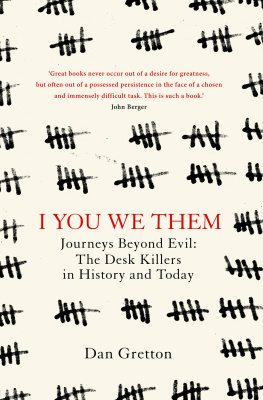

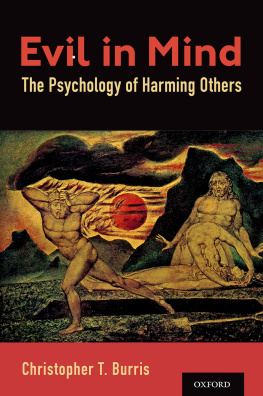

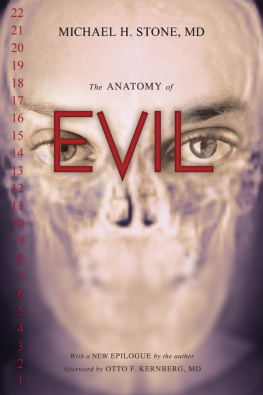
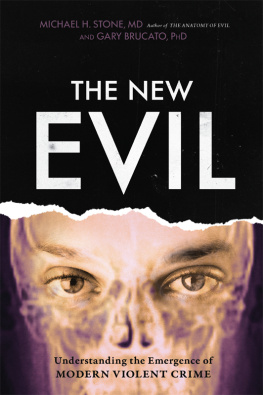

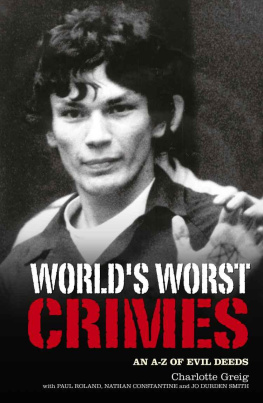
![Charlotte Greig - Evil Serial Killers. In the Minds of Monsters [Fully Illustrated]](/uploads/posts/book/70143/thumbs/charlotte-greig-evil-serial-killers-in-the-minds.jpg)


